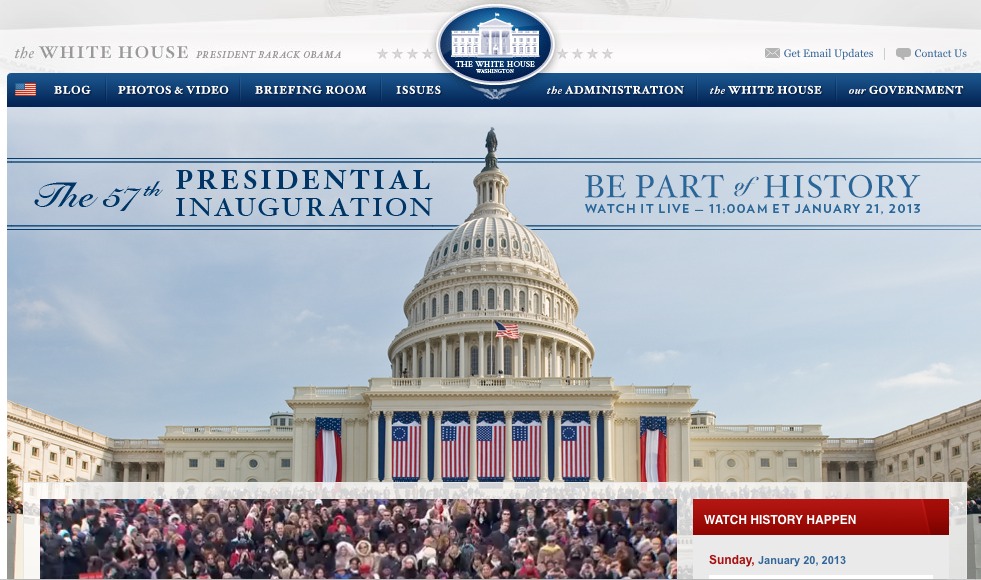On Inauguration Day, history was everywhere
23 January 2013 – Jason Steinhauer

The White House’s Inauguration 2013 page set the tone for “watching history happen.” http://www.whitehouse.gov/inauguration-2013
“History” was on everyone’s lips on Inauguration Day.
Historical rituals marked the ceremony. Historical allusions to the Declaration of Independence and Martin Luther King, Jr., punctuated Obama’s remarks. The media defined the setting as “historic.” A historic Bible was sworn on.
Inside the Capitol, faces from history lined statuary hall while a historical painting of Niagara Falls framed the backdrop. There were even photographs of the moment gifted to President Obama so as to become history one day.
Meanwhile on the Mall, spectators continually spoke of “history” as a primary driver for their attendance. Repeatedly attendees told media interviewers that they “wanted to be a part of history” when asked why they braved the cold and the crowds.“It’s history,” a woman said.
“We wanted to be a part of history,” a family explained.
“It’s a historic occasion,” a man said, grasping his two kids close.
“All kinds of history was out there today,” said Jeffrey Brown on the Newshour later that night, when asking three historians to put the day into perspective.
History, history, history—everywhere you turned.
What to make of “history” playing such a leading role in our nation’s most important day?
What struck me was how much “history” seemed to motivate and validate people’s attendance. A desire to experience history motivated their pilgrimages, and when asked to reflect on the day, history validated their choices. It was fascinating to see how this rationalization continually surfaced in interviews.
Consider, for example, one attendee who said he traveled twelve hours from Reno. He told the Newshour, “I wanted to be part of the experience.” He added, “It’s all about the experience.” Similarly, an African-American man said that to not experience the moment would be like looking at a pool instead of swimming in it.
To “experience history” would seem to be a paradox. To experience is to undergo the present. History is an account of the the past. How can one undergo that which has already happened? “Experience history” may be a catchy tag line for a museum or troupe of historical reenactors, but not a concretely livable condition.
Yet clearly people felt like they were “experiencing history,” however abstrusely. Really what they were saying was that the expectation that the day would one day be deemed “historic” motivated them to actively take part. Theirs were emotional decisions, fueled by desires to belong to and participate in something collectively recognized to be important—as well as to feel pride, joy, and sense of ego in being able to say they were there for a day that will be remembered long after their memory of it fades.
History seemed to validate every pilgrimage, even those that were cut short. A woman who waited three hours at a security checkpoint, and never made it to the Mall, expressed no regrets. “I’d do it again,” she said. “I was still here, I was part of history.” To be part of the historic moment, however tangentially, established the worthiness of the effort.
It should be noted that history’s validating and experiential powers on us have consequences. The collective validation of actions can lead to unwillingness to change practices that may grow obsolete or unjust. And it isn’t solely events deemed significant by those living through them that are eligible to be considered historic.
Still, yesterday showed emphatically that from Commander-in-Chief to person-on-the-street, history can be a powerful driver of human behavior. If we believe that history validates our choices, and that our collective choices comprise the experience of history, then we will form strong emotional attachments to those choices and our rationale in making them. Even before a moment has passed, we’ll look to history to validate our actions–and hope that the future will think as highly of us as we do of ourselves.
~ Jason Steinhauer is Program Specialist for The John W. Kluge Center at the Library of Congress and an award-winning public historian, and an accomplished curator, oral historian, archivist, and musician, and passionate advocate for history.




2 comments